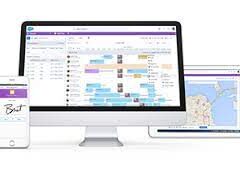Field Service Lightning (FSL) is a comprehensive system developed by Salesforce to streamline the operations of companies providing on-site services. It facilitates the creation of employee records, task assignments, and real-time location monitoring to enhance organizational efficiency.
Formerly recognized as Field Service Lightning (FSL), Salesforce Field Service (SFS) enhances customer experiences through its advanced collaboration capabilities.
Field Service enables businesses to automate tracking and analysis of customer interactions, leading to improved satisfaction rates and quicker response times. Service Cloud further automates customer service processes, including ticket and account management, enhancing overall efficiency.
Offline capabilities in Salesforce FSL encompass caching frequently accessed records for offline viewing and enabling Offline Edit for creating, editing, and deleting records without internet connectivity. These features are accessible on Salesforce for Android and iOS platforms.
Salesforce Lightning empowers users to develop customized applications tailored to specific requirements. With features like drag and drop functionality, improved navigation, and customizable dashboards, Salesforce Lightning enhances productivity and saves time. Notably, Salesforce Lightning offers a modern interface, equivalent cost to Salesforce Classic, more extensive features, and increased access to Einstein functionality.
Salesforce Field Service, previously known as Field Service Lightning, provides a robust, customizable, and mobile-friendly field service hub within Salesforce. It caters to enterprises’ needs for work order, scheduling, and mobile workforce management, offering a wide array of functionalities, including:
- Creation of field service worker, dispatcher, and agent records with detailed skill, location, and availability information.
- Establishment of multilevel service territories representing regions where services are provided.
- Tracking of inventory, warehouses, service vehicles, and customer sites’ location and status.
- Scheduling of one-time or recurring work orders, incorporating worker preferences, required skills, and parts details.
- Implementation of maintenance plans and templates for standardizing field service tasks.
- Generation of service reports to keep customers informed about service progress.
Field Service Lightning, integrated with Salesforce’s Service Cloud, streamlines customer data and record management for support departments. It facilitates seamless coordination between phone and field services, enabling agents to efficiently handle tasks like repairs, installations, and professional services.
To utilize Field Service, a minimum of one Service Cloud user license is required. Existing Service Cloud customers must also possess at least one Dispatcher license or the Field Service Plus bundle, incorporating Service user functionality.
Field Service’s core features, managed package, and mobile app are available in Enterprise, Unlimited, and Developer Editions. The suite includes standard objects such as work orders and service appointments, as well as additional functionalities provided through the managed package:
- Guided Setup tool for configuring Field Service records and settings.
- Dynamic scheduling console for dispatchers and supervisors to oversee team members and appointments.
- Scheduling optimizer for efficient resource allocation based on skill level, travel time, and location.
- Scheduling policies and triggers for customizing scheduling models and display preferences.
The Field Service mobile app, compatible with iOS and Android platforms, enhances mobile workers’ productivity by enabling offline updates to work orders, parts tracking, customer signature collection, and dispatcher communication.
For developers interested in integrating Field Service, resources such as the Field Service Developer Guide offer object relationship diagrams, API reference information, and code samples.
Salesforce Field Service provides a comprehensive solution for managing field service operations, offering extensive customization options and mobile-friendly functionalities to streamline workforce management and enhance customer satisfaction.
Content updated April 2024.













